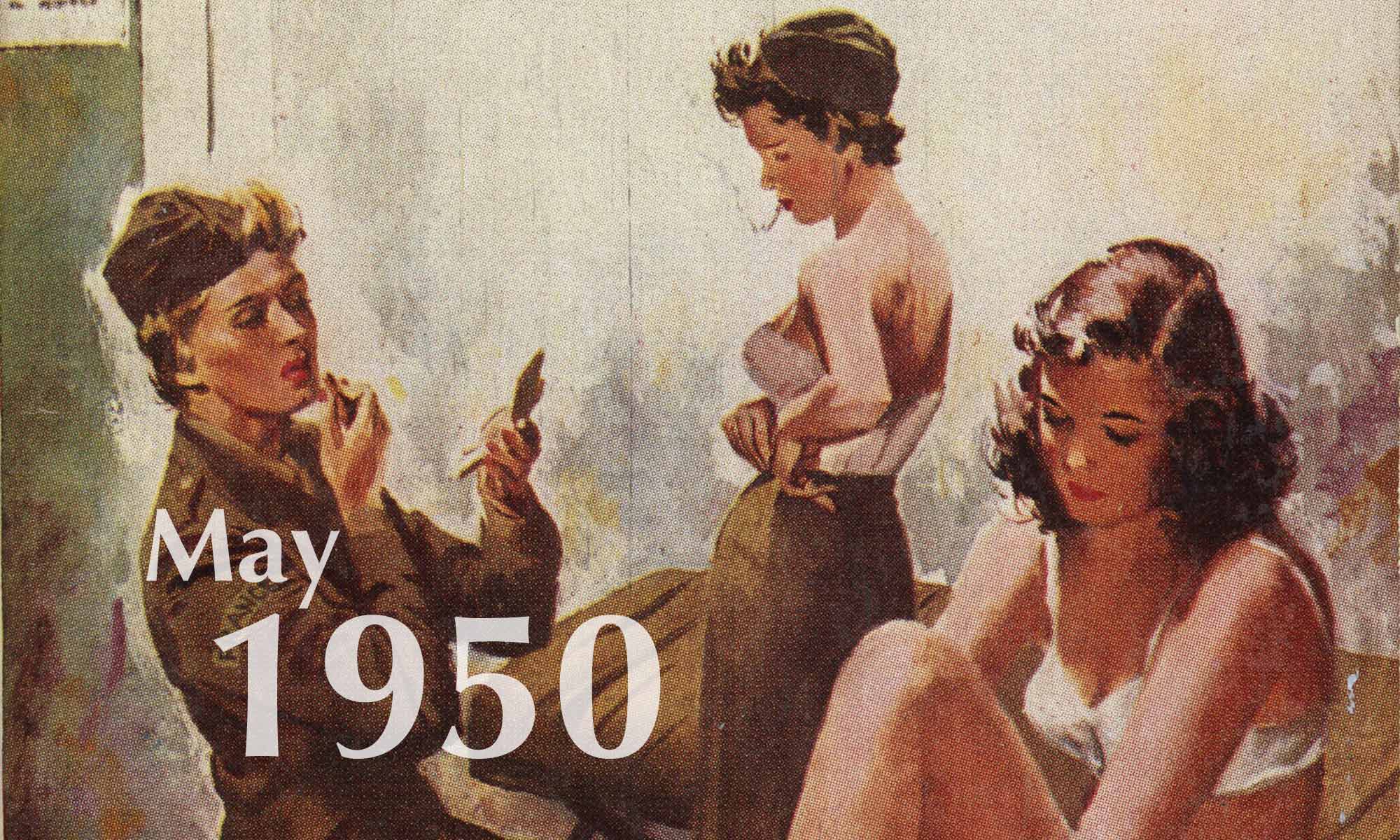| ◄ MAY ► | ||||||
|---|---|---|---|---|---|---|
| ◄ 1950 ► | ||||||
| 1 | 2 | 3 | 4 | 5 | 6 | |
| 7 | 8 | 9 | 10 | 11 | 12 | 13 |
| 14 | 15 | 16 | 17 | 18 | 19 | 20 |
| 21 | 22 | 23 | 24 | 25 | 26 | 27 |
| 28 | 29 | 30 | 31 | |||
| President: | Harry S Truman (D) | |||
| Vice-President: | Alben W. Barkley (D) | |||
| House: | 261 (D) | 168 (R) | 2 (Other) | 4 (Vacant) |
| Southern states: | 101 (D) | 2 (R) | 2 (Vacant) | |
| Senate: | 54 (D) | 42 (R) | ||
| Southern states: | 22 (D) | |||
| GDP growth: | 10.3% | (Annual) | ||
| 3.9% | (Quarterly) | |||
| Inflation: | -0.4% | |||
| Unemployment: | 5.5% | |||
▲Monday, May 1
May Day
![]() May 1: Separate May Day celebrations compete in East, West Berlin. A half a million Berliners turn out for a May Day rally at the Tiergarten, dwarfing the quarter million turnout in Communist East Berlin. Both rallies are peaceful, considering their proximity to each other, and as crowds from both rallies converge at Potsdammer Platz to catch subway trains. Crowds pass easily between East and West Berlin, as East German police have obviously been ordered to avoid provocations. In Yugoslavia, where Marshal Josep Tito’s Communist government has been at odds with the Soviet Union’s harsher line under Joseph Stalin, parade floats in Belgrade lampoon the Soviet Union’s economic hardships and clumsy propaganda. The Yugoslav parade is much more lighthearted, more in keeping with May Day’s more traditional role of a spring festival than a celebration of International Workers’ Day. In Moscow, the Soviet Union stages a huge demonstration of its air power for its parade, with fly-bys of bombers, jet fighters, and, for the first time, new twin-engined Ilyushin Il-28 jet bombers — 227 aircraft in all pass the reviewing stands. A May Day parade in New York marches down Eight Avenue for more than four hours, which makes it the shortest and smallest May Day parades in years.
May 1: Separate May Day celebrations compete in East, West Berlin. A half a million Berliners turn out for a May Day rally at the Tiergarten, dwarfing the quarter million turnout in Communist East Berlin. Both rallies are peaceful, considering their proximity to each other, and as crowds from both rallies converge at Potsdammer Platz to catch subway trains. Crowds pass easily between East and West Berlin, as East German police have obviously been ordered to avoid provocations. In Yugoslavia, where Marshal Josep Tito’s Communist government has been at odds with the Soviet Union’s harsher line under Joseph Stalin, parade floats in Belgrade lampoon the Soviet Union’s economic hardships and clumsy propaganda. The Yugoslav parade is much more lighthearted, more in keeping with May Day’s more traditional role of a spring festival than a celebration of International Workers’ Day. In Moscow, the Soviet Union stages a huge demonstration of its air power for its parade, with fly-bys of bombers, jet fighters, and, for the first time, new twin-engined Ilyushin Il-28 jet bombers — 227 aircraft in all pass the reviewing stands. A May Day parade in New York marches down Eight Avenue for more than four hours, which makes it the shortest and smallest May Day parades in years.
![]()
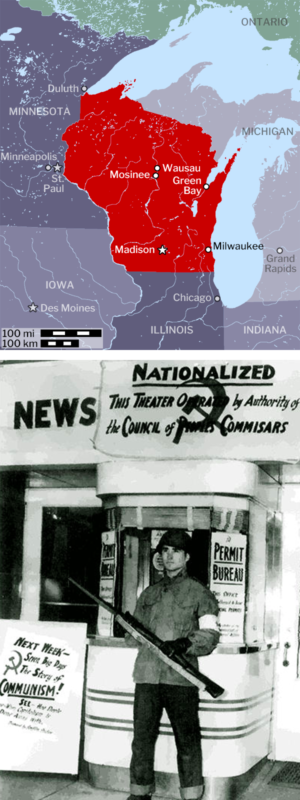 May 1: Wisconsin town “invaded” by reds. The town of Mosinee, Wisconsin, celebrates May Day by staging a mock Communist takeover. The local American Legion, which leads the project, temporarily proclaims the “United Soviet States of America” and renames the town Moskva. As part of the exercise, the mayor allows himself to be “arrested” and the Soviet flag is hoisted in front of the Legion hall. A newspaper, Red Star, appears with glowing tributes to Stalin. Goods in downtown stores are marked up with inflated “liberation prices,” and a Lutheran minister demonstrates to outside reporters how he hid his Bible in the church’s organ. Legion members, dressed as soldiers, man military-style roadblocks at the town limits and hand out pamphlets to motorists explaining the exercise. Later that evening, the mayor arrives at a rally to “restore democracy,” but he suffers a cerebral hemorrhage and never regains consciousness. He dies five days later.
May 1: Wisconsin town “invaded” by reds. The town of Mosinee, Wisconsin, celebrates May Day by staging a mock Communist takeover. The local American Legion, which leads the project, temporarily proclaims the “United Soviet States of America” and renames the town Moskva. As part of the exercise, the mayor allows himself to be “arrested” and the Soviet flag is hoisted in front of the Legion hall. A newspaper, Red Star, appears with glowing tributes to Stalin. Goods in downtown stores are marked up with inflated “liberation prices,” and a Lutheran minister demonstrates to outside reporters how he hid his Bible in the church’s organ. Legion members, dressed as soldiers, man military-style roadblocks at the town limits and hand out pamphlets to motorists explaining the exercise. Later that evening, the mayor arrives at a rally to “restore democracy,” but he suffers a cerebral hemorrhage and never regains consciousness. He dies five days later.
![]() May 1: Pulitzer Prizes announced. The Rodgers and Hammerstein musical South Pacific wins the Pulitzer for best original American play. A.B. Guthrie, Jr., wins the award for best novel for The Way West. Other awards include Samuel Flagg Bemis for John Quincy Adams and the Foundations of American Foreign Policy (biography), Oliver W. Larkin for Art and Life in America (history), Gwendolyn Brooks for Annie Allen (poetry), and Gian-Carlo Menotti for The Consul (music). Journalism prizes are given to the Chicago Daily News and St. Louis Post-Dispatch, and to reporters for the New York Times, Christian Science Monitor, Seattle Times, Jackson (MI) Citizen Patriot, the cartoonist for the Washington Evening Star, and a photographer for the Oakland Tribune.
May 1: Pulitzer Prizes announced. The Rodgers and Hammerstein musical South Pacific wins the Pulitzer for best original American play. A.B. Guthrie, Jr., wins the award for best novel for The Way West. Other awards include Samuel Flagg Bemis for John Quincy Adams and the Foundations of American Foreign Policy (biography), Oliver W. Larkin for Art and Life in America (history), Gwendolyn Brooks for Annie Allen (poetry), and Gian-Carlo Menotti for The Consul (music). Journalism prizes are given to the Chicago Daily News and St. Louis Post-Dispatch, and to reporters for the New York Times, Christian Science Monitor, Seattle Times, Jackson (MI) Citizen Patriot, the cartoonist for the Washington Evening Star, and a photographer for the Oakland Tribune.
▲Tuesday, May 2
![]()
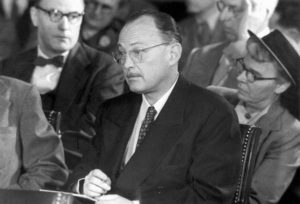 May 2: Lattimore calls charges “a spider-web of lies.” Johns Hopkins professor, China expert, and sometime State Department consultant Owen Lattimore returns to testify again before a special Senate Foreign Relations subcommittee investigating Sen. Joseph McCarthy’s charges of Communists in the State Department. McCarthy has accused Lattimore of being a “top Russian espionage agent” in the U.S. and the “chief architect” of American policy that “betrayed” Nationalist China to the Communists. Lattimore sharply condemns Louis Budenz’s testimony two weeks earlier, calling it a “spider-web of lives” from a “professional informer” with a “twisted and malignant personality” and “extremely sordid motives of personal career and personal profit.” Lattimore frames his fight against McCarthy’s charges as more than just a personal defense. “My obligation is to do everything that I can, by the refutation of these charges, to establish, beyond question, beyond dispute, and beyond further challenge, the right of American scholars and authors to think, talk, and write freely and honestly, without the paralyzing fear of the kind of attack to which I have been subjected.”
May 2: Lattimore calls charges “a spider-web of lies.” Johns Hopkins professor, China expert, and sometime State Department consultant Owen Lattimore returns to testify again before a special Senate Foreign Relations subcommittee investigating Sen. Joseph McCarthy’s charges of Communists in the State Department. McCarthy has accused Lattimore of being a “top Russian espionage agent” in the U.S. and the “chief architect” of American policy that “betrayed” Nationalist China to the Communists. Lattimore sharply condemns Louis Budenz’s testimony two weeks earlier, calling it a “spider-web of lives” from a “professional informer” with a “twisted and malignant personality” and “extremely sordid motives of personal career and personal profit.” Lattimore frames his fight against McCarthy’s charges as more than just a personal defense. “My obligation is to do everything that I can, by the refutation of these charges, to establish, beyond question, beyond dispute, and beyond further challenge, the right of American scholars and authors to think, talk, and write freely and honestly, without the paralyzing fear of the kind of attack to which I have been subjected.”
![]() May 2: Britain lifts wartime restrictions on restaurants. Londoners flock to their favorite restaurants to celebrate the lifting of wartime restrictions governing the cost, portion sizes, and number of courses served for meals. Many delicacies that have been unavailable because of price restrictions are back again, and diners can order as much as they like and spend as much as they want for the first time in eight years. But because restaurants themselves still have to deal with food rationing measures, most will continue to restrict meat dishes to one meat course per customer for the sitting.
May 2: Britain lifts wartime restrictions on restaurants. Londoners flock to their favorite restaurants to celebrate the lifting of wartime restrictions governing the cost, portion sizes, and number of courses served for meals. Many delicacies that have been unavailable because of price restrictions are back again, and diners can order as much as they like and spend as much as they want for the first time in eight years. But because restaurants themselves still have to deal with food rationing measures, most will continue to restrict meat dishes to one meat course per customer for the sitting.
▲Wednesday, May 3
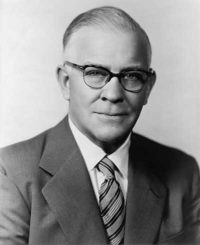 May 3: Rep. Arthur L. Miller says the homosexual drive is similar to menstrual cycles. The fact that Rep. Arthur L. Miller (R-NE) is a doctor makes this especially absurd. Rep. Miller gives his speech before the Nebraska State Medical Association and says: “It is found that the cycle of these individuals’ homosexual desires follow the cycle closely patterned to the menstrual period of women. There may be three or four days in each month that this homosexual’s instincts break down and drive the individual into abnormal fields of sexual practice. Under large doses of sedatives during this sensitive cycle, he may escape such acts.” He will place this speech in the Congressional Record on May 15.
May 3: Rep. Arthur L. Miller says the homosexual drive is similar to menstrual cycles. The fact that Rep. Arthur L. Miller (R-NE) is a doctor makes this especially absurd. Rep. Miller gives his speech before the Nebraska State Medical Association and says: “It is found that the cycle of these individuals’ homosexual desires follow the cycle closely patterned to the menstrual period of women. There may be three or four days in each month that this homosexual’s instincts break down and drive the individual into abnormal fields of sexual practice. Under large doses of sedatives during this sensitive cycle, he may escape such acts.” He will place this speech in the Congressional Record on May 15.▲Thursday, May 4
![]()
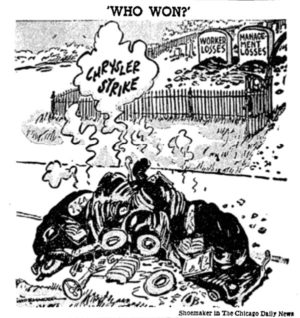 May 4: Strike between Chrysler and UAW ends. The costly 100-day strike against Chrysler nears its bitter end as the company and the United Automobile Workers make separate announcements that the two sides have reached a settlement. The strike may be almost over, but rancor between the two sides remain on full display as UAW says the agreement was reached “without grace” on Chrysler’s part. Relations are so bad that Walter Reuther, president of the UAW, has even refused to attend a joint press briefing with company representatives and mediators. The main sticking points didn’t involve wages, but the company-controlled pension fund and other benefits. In the end, the Chrysler refuses to raise benefits, but it does agree to establish a special pension fund. Neither side is able to claim victory. About 89,000 Chrysler workers and 35,000 supplier employees have been idled by the strike, with each employee having lost an average of $950 in wages (about $10,250 today). The company lost a staggering $1 billion in sales (about $11 billion today). Ford and Chrysler were neck-in-neck in sales in 1949; for 1950, Ford will sell four cars for every three of Chrysler’s. Workers will ratify the pact over the weekend and return to work on Monday.
May 4: Strike between Chrysler and UAW ends. The costly 100-day strike against Chrysler nears its bitter end as the company and the United Automobile Workers make separate announcements that the two sides have reached a settlement. The strike may be almost over, but rancor between the two sides remain on full display as UAW says the agreement was reached “without grace” on Chrysler’s part. Relations are so bad that Walter Reuther, president of the UAW, has even refused to attend a joint press briefing with company representatives and mediators. The main sticking points didn’t involve wages, but the company-controlled pension fund and other benefits. In the end, the Chrysler refuses to raise benefits, but it does agree to establish a special pension fund. Neither side is able to claim victory. About 89,000 Chrysler workers and 35,000 supplier employees have been idled by the strike, with each employee having lost an average of $950 in wages (about $10,250 today). The company lost a staggering $1 billion in sales (about $11 billion today). Ford and Chrysler were neck-in-neck in sales in 1949; for 1950, Ford will sell four cars for every three of Chrysler’s. Workers will ratify the pact over the weekend and return to work on Monday.
![]() Mon 4: USSR says all German POWs have been released. The Soviet Union crushes the hopes of hundreds of thousands of Germans with the news that the repatriation of German prisoners of war held by the USSR is complete. German authorities say that some 400,000 POWs are still being held in the Soviet Union.
Mon 4: USSR says all German POWs have been released. The Soviet Union crushes the hopes of hundreds of thousands of Germans with the news that the repatriation of German prisoners of war held by the USSR is complete. German authorities say that some 400,000 POWs are still being held in the Soviet Union.
▲Friday, May 5
▲Saturday, May 6
![]()
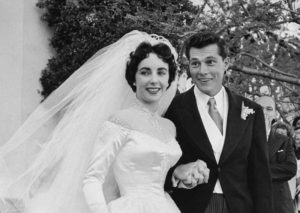 May 6: Elizabeth Taylor marries Nicky Hilton. Eighteen-year-old movie star Elizabeth Taylor marries twenty-three-year-old Conrad “Nicky” Hilton, Jr., heir to the hotel fortune, and Good Shepherd Catholic Church in Beverly Hills. About 700 big names of the film industry attend the wedding organized by MGM. It is the first marriage for both. Taylor will realize within weeks that she made a mistake in marrying the abusive and alcoholic Hilton. They will divorce eight months later.
May 6: Elizabeth Taylor marries Nicky Hilton. Eighteen-year-old movie star Elizabeth Taylor marries twenty-three-year-old Conrad “Nicky” Hilton, Jr., heir to the hotel fortune, and Good Shepherd Catholic Church in Beverly Hills. About 700 big names of the film industry attend the wedding organized by MGM. It is the first marriage for both. Taylor will realize within weeks that she made a mistake in marrying the abusive and alcoholic Hilton. They will divorce eight months later.
▲Sunday, May 7
![]()
 May 7: Fire ravages Quebec town. Half of the industrial town of Rimouski, Quebec, about 185 miles northeast of Quebec city, is destroyed by fire. The blaze begins when strong winds blow a power line onto a pulpwood pile at the Price Brothers lumber yard. The winds drive the flames through the city of 15,000. It takes two days before the fire is brought under control. Miraculously, no one dies, but 2,000 are left homeless. The fire will be known as La nuit rouge (the Red Night).
May 7: Fire ravages Quebec town. Half of the industrial town of Rimouski, Quebec, about 185 miles northeast of Quebec city, is destroyed by fire. The blaze begins when strong winds blow a power line onto a pulpwood pile at the Price Brothers lumber yard. The winds drive the flames through the city of 15,000. It takes two days before the fire is brought under control. Miraculously, no one dies, but 2,000 are left homeless. The fire will be known as La nuit rouge (the Red Night).
▲Monday, May 8
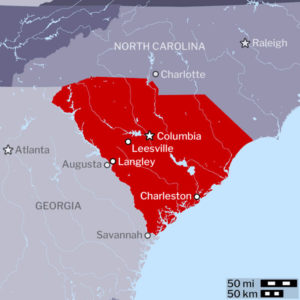 May 8: KKK holds rally near Augusta. The Ku Klux Klan holds a Spring Festival in Langley, South Carolina, just across the state line from Augusta, Georgia. A tall man dressed in a purple velvet robe and hood, and identifying himself only as “Nathan II,” Emperor of the Imperial Council of the Ku Klux Klans of America, addresses a gathering while standing on the back of a truck parked behind the brick “Klan Klavern” building. He tells the 125 spectators that “the days of reconstruction are coming back.” He blames “Asiatic Jews,” who he says are different from “Hebrew Jews,” for being the “troublemakers of the world” by organizing the “Zionist movement which is now the Communist movement.” He brands B’nai B’rith, the Jewish Anti-Defamation League, as a Communist front “who follow us usually around to these meetings.” He also says the NAACP is a Communist front. “We will only strike in defense,” he says. “But our first bullets will be against the Asiatic Jews and our second bullets against the Negroes they lead.” He is the only robed person at the festival. Others present are Thomas L. Hamilton of Leesville and head of the Association of Carolina Klans, and Bill Hendrix of Tallahassee, Florida, of the Southern Knights of the Ku Klux Klan. Hendrix singles out Ralph McGill, the Atlanta Constitution’s editor, for writing “dirty pieces about the Klan” and charges him with writing for Communist publications. Hendrix also warns, “We’re going to have our parades if we have to shoot our way through.”
May 8: KKK holds rally near Augusta. The Ku Klux Klan holds a Spring Festival in Langley, South Carolina, just across the state line from Augusta, Georgia. A tall man dressed in a purple velvet robe and hood, and identifying himself only as “Nathan II,” Emperor of the Imperial Council of the Ku Klux Klans of America, addresses a gathering while standing on the back of a truck parked behind the brick “Klan Klavern” building. He tells the 125 spectators that “the days of reconstruction are coming back.” He blames “Asiatic Jews,” who he says are different from “Hebrew Jews,” for being the “troublemakers of the world” by organizing the “Zionist movement which is now the Communist movement.” He brands B’nai B’rith, the Jewish Anti-Defamation League, as a Communist front “who follow us usually around to these meetings.” He also says the NAACP is a Communist front. “We will only strike in defense,” he says. “But our first bullets will be against the Asiatic Jews and our second bullets against the Negroes they lead.” He is the only robed person at the festival. Others present are Thomas L. Hamilton of Leesville and head of the Association of Carolina Klans, and Bill Hendrix of Tallahassee, Florida, of the Southern Knights of the Ku Klux Klan. Hendrix singles out Ralph McGill, the Atlanta Constitution’s editor, for writing “dirty pieces about the Klan” and charges him with writing for Communist publications. Hendrix also warns, “We’re going to have our parades if we have to shoot our way through.”![]() May 8: State Department announces aid to Indochina. Secretary of State Dean Acheson announces that the U.S. will give $23 million (about $250 million today) in military and economic aid to France and Indochina to defend against Communist threats in Southeast Asia and for the “development of genuine nationalism there.” War-ravaged and cash-strapped France had insisted for months that the defense of its colonies in Southeast Asia against Communist insurgencies should be an international responsibility. French intelligence says it has received information that Ho Chi Minh’s rebel Viet Minh government has concluded a secret military agreement with Communist China, and France has strongly urged the U.S. to speed deliveries of material, especially aircraft, to French forces in Vietnam. Acheson reiterates, “The problem of meeting the threat to the security of Vietnam, Cambodia and Laos, which now enjoy independence within the French Union, is primarily the responsibility of France and the governments and peoples of Indo-China.”
May 8: State Department announces aid to Indochina. Secretary of State Dean Acheson announces that the U.S. will give $23 million (about $250 million today) in military and economic aid to France and Indochina to defend against Communist threats in Southeast Asia and for the “development of genuine nationalism there.” War-ravaged and cash-strapped France had insisted for months that the defense of its colonies in Southeast Asia against Communist insurgencies should be an international responsibility. French intelligence says it has received information that Ho Chi Minh’s rebel Viet Minh government has concluded a secret military agreement with Communist China, and France has strongly urged the U.S. to speed deliveries of material, especially aircraft, to French forces in Vietnam. Acheson reiterates, “The problem of meeting the threat to the security of Vietnam, Cambodia and Laos, which now enjoy independence within the French Union, is primarily the responsibility of France and the governments and peoples of Indo-China.”
▲Tuesday, May 9
![]() May 9: Canada refuses to ban Communist Party. Canada’s House of Commons defeats a Progressive Conservative Party attempt to amend the Criminal Code to outlaw the Communist Party and criminalize Communist activities. The debate is one of the most acrimonious of the session. Progressive Conservative leader George Drew moved the amendment in the House a week ago “to see that not a single Canadian youth will have his faith destroyed by these servants of the Kremlin.” But Liberal Justice Minister Stuart Garson says that Canada’s existing anti-subversion laws are already adequate. Member A.J. Bater (Lib) says that Canada’s free press is justification enough to not pass the amendment because free speech is a strong weapon against Communism. John Diefenbaker (PC) counters that if that were the case, then why are seventeen foreign language newspapers, some openly advocating a change of government by force, allowed to exist with impunity? He also asks why Communists are allowed to travel across Canada. Diefenbaker says that the Royal Canadian Mounted Police has every dangerous Communist in the country “right under their thumb … Prosecution is possible; conviction is possible.” But Social Credit leader Solon Low points out that while the Communist Party may be an entity subject to the laws of Canada, Communism is a “state of mind — something that cannot be banned by an act of Parliament.” Commons rejects the amendment by a vote of 147 to 232. Social Credit, the Co-operative Commonwealth Federation, and the ruling Liberal Party oppose the amendment.
May 9: Canada refuses to ban Communist Party. Canada’s House of Commons defeats a Progressive Conservative Party attempt to amend the Criminal Code to outlaw the Communist Party and criminalize Communist activities. The debate is one of the most acrimonious of the session. Progressive Conservative leader George Drew moved the amendment in the House a week ago “to see that not a single Canadian youth will have his faith destroyed by these servants of the Kremlin.” But Liberal Justice Minister Stuart Garson says that Canada’s existing anti-subversion laws are already adequate. Member A.J. Bater (Lib) says that Canada’s free press is justification enough to not pass the amendment because free speech is a strong weapon against Communism. John Diefenbaker (PC) counters that if that were the case, then why are seventeen foreign language newspapers, some openly advocating a change of government by force, allowed to exist with impunity? He also asks why Communists are allowed to travel across Canada. Diefenbaker says that the Royal Canadian Mounted Police has every dangerous Communist in the country “right under their thumb … Prosecution is possible; conviction is possible.” But Social Credit leader Solon Low points out that while the Communist Party may be an entity subject to the laws of Canada, Communism is a “state of mind — something that cannot be banned by an act of Parliament.” Commons rejects the amendment by a vote of 147 to 232. Social Credit, the Co-operative Commonwealth Federation, and the ruling Liberal Party oppose the amendment.
▲Wednesday, May 10
![]()
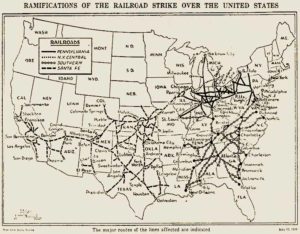 May 10: Four railroads struck. The Brotherhood of Locomotive Firemen and Enginemen call a strike against four major railroads. The main issue in the strike is the union’s demand for a second fireman on multi-unit Diesel locomotives. Two fact-finding boards, one appointed by President Roosevelt in 1943 an a second one appointed by President Truman in 1949 have found that the demand isn’t justified. The four railroads targeted are the New York Central west of Buffalo, the Pennsylvania Railroad west of Harrisburg, the Atchison, Topeka and Santa Fe, and the Southern Railway. Other lines using the four railroad companies’ tracks, such as the Chesapeake and Ohio, are also affected. Thousands of workers at steel mills, coal mines, auto workers are laid off over the next two days.
May 10: Four railroads struck. The Brotherhood of Locomotive Firemen and Enginemen call a strike against four major railroads. The main issue in the strike is the union’s demand for a second fireman on multi-unit Diesel locomotives. Two fact-finding boards, one appointed by President Roosevelt in 1943 an a second one appointed by President Truman in 1949 have found that the demand isn’t justified. The four railroads targeted are the New York Central west of Buffalo, the Pennsylvania Railroad west of Harrisburg, the Atchison, Topeka and Santa Fe, and the Southern Railway. Other lines using the four railroad companies’ tracks, such as the Chesapeake and Ohio, are also affected. Thousands of workers at steel mills, coal mines, auto workers are laid off over the next two days.
▲Thursday, May 11
▲Friday, May 12
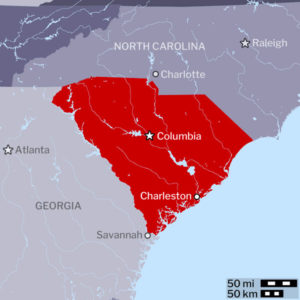 May 12: Klan motorcade parades through North Charleston. The motorcade, consisting of about 50 automobiles, forms on U.S. Highway 17 at about 8:00 p.m. and criss-crosses through North Charleston, passing mainly through African-American neighborhoods. The lead car is a black, late-model Ford bearing a three-foot high electric cross with red lightbulbs on the left front bumper and an American flag on the right front bumper. It appears to be the same car as the one leading the motorcade in Abbeville two weeks ago. Flyers thrown out by the riders identify the group as members of the Association of Carolina Klans. At least three of the cars are equipped with sirens which emit a continuous low moan during the entire parade. No violence is reported, but some Klansmen apparently object to being photographed by a news reporter. The reporter, O.M. Hays and an accompanying photographer for the Charleston News and Courier, are chased by several Klansmen in a 90-mile-an-hour getaway on U.S. Route 52 after taking a photo at the assembly area. Both men get away safely. One reporter notes that by watching the Klan disperse from Yeamans Park at the conclusion of the procession, it appears that about half of them have come from the Charleston area.
May 12: Klan motorcade parades through North Charleston. The motorcade, consisting of about 50 automobiles, forms on U.S. Highway 17 at about 8:00 p.m. and criss-crosses through North Charleston, passing mainly through African-American neighborhoods. The lead car is a black, late-model Ford bearing a three-foot high electric cross with red lightbulbs on the left front bumper and an American flag on the right front bumper. It appears to be the same car as the one leading the motorcade in Abbeville two weeks ago. Flyers thrown out by the riders identify the group as members of the Association of Carolina Klans. At least three of the cars are equipped with sirens which emit a continuous low moan during the entire parade. No violence is reported, but some Klansmen apparently object to being photographed by a news reporter. The reporter, O.M. Hays and an accompanying photographer for the Charleston News and Courier, are chased by several Klansmen in a 90-mile-an-hour getaway on U.S. Route 52 after taking a photo at the assembly area. Both men get away safely. One reporter notes that by watching the Klan disperse from Yeamans Park at the conclusion of the procession, it appears that about half of them have come from the Charleston area.▲Saturday, May 13
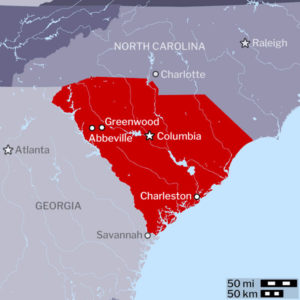 May 13: KKK parades through Greenwood, shoots at dance hall. A small Ku Klux Klan motorcade of nineteen cars parade through Greenwood, South Carolina. The motorcade passes alternately through African-American neighborhoods and the downtown business district. At least two of the cars have sirens that wail throughout the tour. The lead car is the same black, late-model Ford bearing a three-foot high electric cross and American flag on its front bumper that was spotted last night in North Charleston and two weeks ago in nearby Abbeville. The cars carry an estimated 75 people wearing Klan robes. The parade eventually drives out of town to the M&M Club Skyline, a dance hall popular with African-Americans. The motorcade encircles the club and someone fires off five pistol shots in quick succession before the parade disperses. The next day, a man identifying himself only as the Kleagle of the local Greenwood Klavern, calls the Greenwood Journal-Index and says that his Klavern had nothing to do with the parade. His Klan is aligned with the Association of Georgia Klans headed by Sam Roper. The Georgia Klans is a rival group to the Association of Carolina Klans, headed by Thomas L. Hamilton. “This other crowd,” says the unidentified Kleagle, “is a bunch of hoodlums trying to stir up trouble.” Hamilton acknowledges to the Journal-Index that, in fact, it was his Klan that put on the parade. And not only that, but that he drove the lead car in Greenwood and in North Charleston Friday night. “We represent the leading citizens of South Carolina,” he says. Hamilton announces that he will lead a meeting this Saturday in Denmark, SC. “It will be a large walking parade with public speaking,” he says, and promises it will be one of the largest meetings ever held in the state.
May 13: KKK parades through Greenwood, shoots at dance hall. A small Ku Klux Klan motorcade of nineteen cars parade through Greenwood, South Carolina. The motorcade passes alternately through African-American neighborhoods and the downtown business district. At least two of the cars have sirens that wail throughout the tour. The lead car is the same black, late-model Ford bearing a three-foot high electric cross and American flag on its front bumper that was spotted last night in North Charleston and two weeks ago in nearby Abbeville. The cars carry an estimated 75 people wearing Klan robes. The parade eventually drives out of town to the M&M Club Skyline, a dance hall popular with African-Americans. The motorcade encircles the club and someone fires off five pistol shots in quick succession before the parade disperses. The next day, a man identifying himself only as the Kleagle of the local Greenwood Klavern, calls the Greenwood Journal-Index and says that his Klavern had nothing to do with the parade. His Klan is aligned with the Association of Georgia Klans headed by Sam Roper. The Georgia Klans is a rival group to the Association of Carolina Klans, headed by Thomas L. Hamilton. “This other crowd,” says the unidentified Kleagle, “is a bunch of hoodlums trying to stir up trouble.” Hamilton acknowledges to the Journal-Index that, in fact, it was his Klan that put on the parade. And not only that, but that he drove the lead car in Greenwood and in North Charleston Friday night. “We represent the leading citizens of South Carolina,” he says. Hamilton announces that he will lead a meeting this Saturday in Denmark, SC. “It will be a large walking parade with public speaking,” he says, and promises it will be one of the largest meetings ever held in the state.![]() May 13: Railroad strike expands. The strike begun on Wednesday by the Brotherhood of Locomotive Firemen and Enginemen against four major railroads has now spread to the Union Pacific Railroad, where the unions have embargoed a 100 mile (160 km) section of the line between Daggett and San Bernardino. The tracks in question belong to the Santa Fe Railroad, but Union Pacific runs trains between Ogden, Utah and Los Angeles on this section of track. Striking railroad worker say they won’t run Union Pacific trains over the Santa Fe track. The other lines struck are the New York Central, the Pennsylvania, and the Southern. Unemployment caused by the walkout, which includes workers laid off in industries served by the railroads, is now hovering at around the 100,000 mark.
May 13: Railroad strike expands. The strike begun on Wednesday by the Brotherhood of Locomotive Firemen and Enginemen against four major railroads has now spread to the Union Pacific Railroad, where the unions have embargoed a 100 mile (160 km) section of the line between Daggett and San Bernardino. The tracks in question belong to the Santa Fe Railroad, but Union Pacific runs trains between Ogden, Utah and Los Angeles on this section of track. Striking railroad worker say they won’t run Union Pacific trains over the Santa Fe track. The other lines struck are the New York Central, the Pennsylvania, and the Southern. Unemployment caused by the walkout, which includes workers laid off in industries served by the railroads, is now hovering at around the 100,000 mark.
▲Sunday, May 14
Mother’s Day
![]()
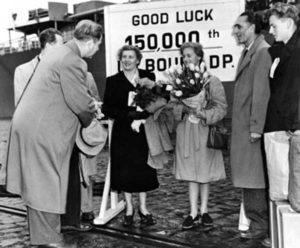 May 14: 150,000th refugee enters U.S. Dace Epermanis, a 12-year-old Latvian girl, is honored in New York as the 150,000th displaced person to reach the U.S. since the passage of the Displaced Persons Act of 1948. She arrives with her family aboard the Navy transport Gen. C.C. Ballou, and is welcomed by Ugo Carusi, chairman of the Displaced Persons Commission, while an Army band plays “God Bless America.” Dace and her family will be invited to the White House to meet with President Truman. Dace will go on to earn a law degree and serve as an Assistant Attorney General for the state of New York.
May 14: 150,000th refugee enters U.S. Dace Epermanis, a 12-year-old Latvian girl, is honored in New York as the 150,000th displaced person to reach the U.S. since the passage of the Displaced Persons Act of 1948. She arrives with her family aboard the Navy transport Gen. C.C. Ballou, and is welcomed by Ugo Carusi, chairman of the Displaced Persons Commission, while an Army band plays “God Bless America.” Dace and her family will be invited to the White House to meet with President Truman. Dace will go on to earn a law degree and serve as an Assistant Attorney General for the state of New York.
▲Monday, May 15
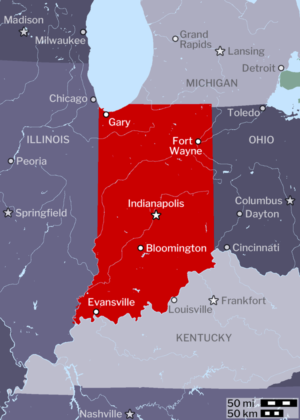 May 15: Bloomington restaurants refuse service to black patrons. Eight restaurants in downtown Bloomington, Indiana, close down indefinitely in a dispute over serving African-American patrons. For the past several months, mixed groups of white and black students from Indiana University have been coming in together and demanding service. When a group entered a downtown restaurant yesterday, they were served, but the restaurant immediately closed for the evening. A spokesman for the eight restaurants say they “have closed in the interests of public safety as a result of an organized effort on the part of a group of individuals to force their patronage on restaurants in the business district. The operators elected to take this action to forestall any incidents which might be the foundation of civil violence.” But Bloomington police say they have no record of any incidents “because there was no violence.” Restaurants closer to the IU campus have been serving patrons without regard to race for several months. Indiana law prohibits segregation based on race. The restaurant owners will relent three days later and re-open to “serve all colors and races.”
May 15: Bloomington restaurants refuse service to black patrons. Eight restaurants in downtown Bloomington, Indiana, close down indefinitely in a dispute over serving African-American patrons. For the past several months, mixed groups of white and black students from Indiana University have been coming in together and demanding service. When a group entered a downtown restaurant yesterday, they were served, but the restaurant immediately closed for the evening. A spokesman for the eight restaurants say they “have closed in the interests of public safety as a result of an organized effort on the part of a group of individuals to force their patronage on restaurants in the business district. The operators elected to take this action to forestall any incidents which might be the foundation of civil violence.” But Bloomington police say they have no record of any incidents “because there was no violence.” Restaurants closer to the IU campus have been serving patrons without regard to race for several months. Indiana law prohibits segregation based on race. The restaurant owners will relent three days later and re-open to “serve all colors and races.”▲Tuesday, May 16
![]()
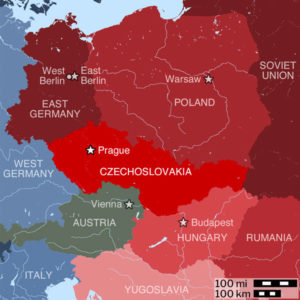 May 16: Czech U.N. representative defects. Vladimir Houdek, Czechoslovakia’s representative to the United Nations, has quit his post, and asked for asylum in the U.S. for himself and his family. He says that Czechoslovakia has “ceased to exist as an independent state,” and cabled a protest to Soviet Premier Joseph Stalin against Soviet actions in Czechoslovakia. Houdek became Czechoslovakia’s representative to the U.N. in March, 1948, a few days after the Soviet-led Communist coup in Prague. Until now, he had been a staunch defender of his country and the Soviet Union. Houdek’s predecessor at the U.N., Dr. Jan Papanek, doesn’t believe Houdek’s change of heart for one minute. He says that Houdek, who was due to leave New York tomorrow on the Queen Elizabeth for home leave, has actually been recalled for “consultation,” which, Papanek points out, is how the Prague government purges diplomats. Papanek says that Houdek is resigning to avoid arrest when he gets back home. Since Soviet Vice Premier Nokolai Bulganin visited Prague on May 7, four top leaders of the Czechoslovakia armed forces, including its Chief of Staff and head of the Air Force, have been dismissed.
May 16: Czech U.N. representative defects. Vladimir Houdek, Czechoslovakia’s representative to the United Nations, has quit his post, and asked for asylum in the U.S. for himself and his family. He says that Czechoslovakia has “ceased to exist as an independent state,” and cabled a protest to Soviet Premier Joseph Stalin against Soviet actions in Czechoslovakia. Houdek became Czechoslovakia’s representative to the U.N. in March, 1948, a few days after the Soviet-led Communist coup in Prague. Until now, he had been a staunch defender of his country and the Soviet Union. Houdek’s predecessor at the U.N., Dr. Jan Papanek, doesn’t believe Houdek’s change of heart for one minute. He says that Houdek, who was due to leave New York tomorrow on the Queen Elizabeth for home leave, has actually been recalled for “consultation,” which, Papanek points out, is how the Prague government purges diplomats. Papanek says that Houdek is resigning to avoid arrest when he gets back home. Since Soviet Vice Premier Nokolai Bulganin visited Prague on May 7, four top leaders of the Czechoslovakia armed forces, including its Chief of Staff and head of the Air Force, have been dismissed.
![]() May 16: Railroad strike ends. Railroads and industrial operations affected by the six-day strike by Brotherhood of Locomotive Firemen and Enginemen against five railroads rush to resume full operations following a settlement. An estimated 200,000 workers have been idled when 18,000 railroad workers first went on strike on May 10.
May 16: Railroad strike ends. Railroads and industrial operations affected by the six-day strike by Brotherhood of Locomotive Firemen and Enginemen against five railroads rush to resume full operations following a settlement. An estimated 200,000 workers have been idled when 18,000 railroad workers first went on strike on May 10.
▲Wednesday, May 17
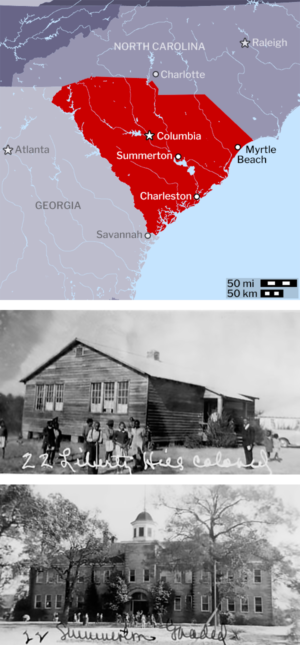 May 17: NAACP files desegregation suit against South Carolina schools. Attorneys for the NAACP file a lawsuit against Clarendon County’s Summerton School District 22, challenging the district’s segregation policies. The NAACP complaint says that the Summerton district forces African-American children to use school buildings and facilities that are inferior to those used by white students. Most negro schools are small wooden shacks of one or two rooms without electricity or running water. In the winter, black students are often sent out into the woods to forage for wood for heat. White students attend nice red-brick school buildings with separate lunchrooms and science labs. The complaint also says that African-American children aren’t offered the free school bus services offered to whites, requiring some students to walk as much as nine miles to school. Thirty school busses serve white students, but there are none for blacks. For every dollar the district spends on a white student, only 24¢ is allocated for a black student. The complaint charges that these students are discriminated against solely because of their race and color, in violation of the 14th Amendment of the U.S. Constitution. Briggs v. Elliot is the first of five cases that will eventually be combined and heard by the U.S. Supreme Court as part of Brown vs. Board of Education of Topeka in 1954.
May 17: NAACP files desegregation suit against South Carolina schools. Attorneys for the NAACP file a lawsuit against Clarendon County’s Summerton School District 22, challenging the district’s segregation policies. The NAACP complaint says that the Summerton district forces African-American children to use school buildings and facilities that are inferior to those used by white students. Most negro schools are small wooden shacks of one or two rooms without electricity or running water. In the winter, black students are often sent out into the woods to forage for wood for heat. White students attend nice red-brick school buildings with separate lunchrooms and science labs. The complaint also says that African-American children aren’t offered the free school bus services offered to whites, requiring some students to walk as much as nine miles to school. Thirty school busses serve white students, but there are none for blacks. For every dollar the district spends on a white student, only 24¢ is allocated for a black student. The complaint charges that these students are discriminated against solely because of their race and color, in violation of the 14th Amendment of the U.S. Constitution. Briggs v. Elliot is the first of five cases that will eventually be combined and heard by the U.S. Supreme Court as part of Brown vs. Board of Education of Topeka in 1954.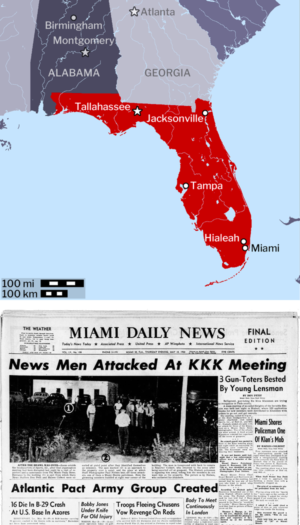 May 17: Klansmen attack newspaper reporters. Armed Klansmen attack four newsmen covering a Klan organizational meeting at Hialeah, Florida. The Klan had temporarily disbanded two years ago following a Hialeah Home News exposé. Attacked are Home News publisher Jay Morton, Miami Daily News reporters Haines Colbert and Don Petit, and Daily News photographer Paul Nielson. An armed Klan guard stop Petit and Colbert as they approach the small cinderblock clubhouse bearing a “Sports, Inc.” neon sign, on the corner of Red Road and 44th St. As Morton and Nielson approach the confrontation, another guard recognizes Morton, shouts at him for being a “dirty Jew” and rushes the pair. He strikes Morton with a flashlight. Nielson, a nineteen-year-old University of Miami student, flattens that guard with one punch. He then takes down a third one who runs up on the pair in the same manner. Police arrive as the second guard recovers his senses and points a pistol at Nielson. Police claim they they could discover no violations and make no arrests. Maybe because that third guard, James Bazemore, is a rookie Miami Shores policeman. Bazemore joined the force despite being convicted three years earlier of holding an immigrant in his car, beating him, forcing him to sing the “Star Spangled Banner,”and dumping him in a ditch near Hialeah — after forcing the man to wipe his blood off the car’s windows. Miami Shores Police Chief Stuart Senneff acknowledges that Bazemore, who has been on the force for only a few months, admitted to being at the meeting, but denied that he was involved in the confrontation. After strong criticism from the press and Miami Shores officials, Senneff allows Bazeman to resign the next day “for the good of the department.” According to Petit, the Klan meeting was called to re-launch the Klavern and start a new membership drive, and 500 application blanks for new members are distributed to Klansmen with instructions to go out and sign up new recruits. The new Hialeah Klan is chartered under the “Sports, Inc.” front. A week later, the Hialeah city council adopts an ordinance banning cross burnings and wearing masks. But the Klan remains undeterred. They meet again the following night in the same cinderblock building. The Daily News reports that there are probably twice as many cars parked around the building as the week before.
May 17: Klansmen attack newspaper reporters. Armed Klansmen attack four newsmen covering a Klan organizational meeting at Hialeah, Florida. The Klan had temporarily disbanded two years ago following a Hialeah Home News exposé. Attacked are Home News publisher Jay Morton, Miami Daily News reporters Haines Colbert and Don Petit, and Daily News photographer Paul Nielson. An armed Klan guard stop Petit and Colbert as they approach the small cinderblock clubhouse bearing a “Sports, Inc.” neon sign, on the corner of Red Road and 44th St. As Morton and Nielson approach the confrontation, another guard recognizes Morton, shouts at him for being a “dirty Jew” and rushes the pair. He strikes Morton with a flashlight. Nielson, a nineteen-year-old University of Miami student, flattens that guard with one punch. He then takes down a third one who runs up on the pair in the same manner. Police arrive as the second guard recovers his senses and points a pistol at Nielson. Police claim they they could discover no violations and make no arrests. Maybe because that third guard, James Bazemore, is a rookie Miami Shores policeman. Bazemore joined the force despite being convicted three years earlier of holding an immigrant in his car, beating him, forcing him to sing the “Star Spangled Banner,”and dumping him in a ditch near Hialeah — after forcing the man to wipe his blood off the car’s windows. Miami Shores Police Chief Stuart Senneff acknowledges that Bazemore, who has been on the force for only a few months, admitted to being at the meeting, but denied that he was involved in the confrontation. After strong criticism from the press and Miami Shores officials, Senneff allows Bazeman to resign the next day “for the good of the department.” According to Petit, the Klan meeting was called to re-launch the Klavern and start a new membership drive, and 500 application blanks for new members are distributed to Klansmen with instructions to go out and sign up new recruits. The new Hialeah Klan is chartered under the “Sports, Inc.” front. A week later, the Hialeah city council adopts an ordinance banning cross burnings and wearing masks. But the Klan remains undeterred. They meet again the following night in the same cinderblock building. The Daily News reports that there are probably twice as many cars parked around the building as the week before.![]()
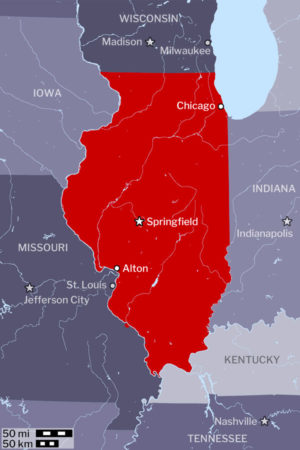 May 17: Four crosses burn in Alton. Four fiery crosses light the night sky around African-American neighborhoods in Alton, Illinois. Three crosses are lit in the city’s African-American neighborhoods, and one is burned on Salu Street just outside the city limits. This is the second cross-burning incident in Alton since February 4. Alton’s public schools are the subject of an NAACP lawsuit, which asks the state to enforce its law which blocks state funding of segregated school districts.
May 17: Four crosses burn in Alton. Four fiery crosses light the night sky around African-American neighborhoods in Alton, Illinois. Three crosses are lit in the city’s African-American neighborhoods, and one is burned on Salu Street just outside the city limits. This is the second cross-burning incident in Alton since February 4. Alton’s public schools are the subject of an NAACP lawsuit, which asks the state to enforce its law which blocks state funding of segregated school districts.
▲Thursday, May 18
▲Friday, May 19
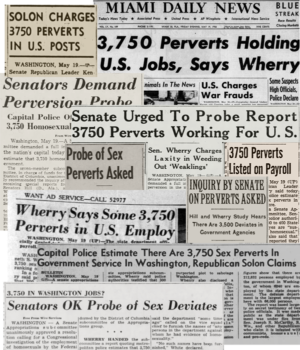 May 19: DC police estimate 3,750 “sex perverts” are working in the federal government.” Senate Republican Leader Kenneth S. Wherry (R-NE) reveals to reporters that Washington, D.C. police provided that estimate during a closed session of a Senate Appropriations Subcommittee. D.C. Vice Department head, Lt. Roy Blick, testified that his estimate of 300 to 400 gays employees in the State Department was based on “a quick guess.” He guessed that there are five thousand homosexual men in the District of Columbia (out of a population of 800,000), and that three-fourths of them hold government jobs. Wherry praises Blick as a “one-man watchdog of the city’s morals,” but Wherry is disappointed that the city’s vice squad doesn’t maintain a master list of arrested homosexuals to cross-check against federal employment rolls. Wherry also tells reporters that his committee has uncovered “a plan of Communists to sabotage and damage” Washington if war were to break out. The plan allegedly involves a “Red Fifth Column” using “sex degenerates for subversive purposes,” though he didn’t give any details of the purported plot. He also claims to have traced a “nest of homosexuals” to the Soviet embassy.
May 19: DC police estimate 3,750 “sex perverts” are working in the federal government.” Senate Republican Leader Kenneth S. Wherry (R-NE) reveals to reporters that Washington, D.C. police provided that estimate during a closed session of a Senate Appropriations Subcommittee. D.C. Vice Department head, Lt. Roy Blick, testified that his estimate of 300 to 400 gays employees in the State Department was based on “a quick guess.” He guessed that there are five thousand homosexual men in the District of Columbia (out of a population of 800,000), and that three-fourths of them hold government jobs. Wherry praises Blick as a “one-man watchdog of the city’s morals,” but Wherry is disappointed that the city’s vice squad doesn’t maintain a master list of arrested homosexuals to cross-check against federal employment rolls. Wherry also tells reporters that his committee has uncovered “a plan of Communists to sabotage and damage” Washington if war were to break out. The plan allegedly involves a “Red Fifth Column” using “sex degenerates for subversive purposes,” though he didn’t give any details of the purported plot. He also claims to have traced a “nest of homosexuals” to the Soviet embassy.![]()
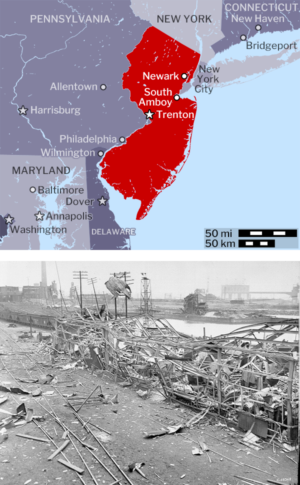 May 19: Massive explosion destroys New Jersey town. Thirty-one people are killed and hundreds injured in South Amboy, New Jersey, when 420 tons of military munitions explode. The munitions are part of two shipments, one of land mines bound for Pakistan and one of gelatin dynamite destined for Afghanistan. The shipments are being loaded from railroad cars onto barges, to be carried out to the steamship Flying Clipper. Thirty-one are killed, most of them dockworkers whose bodies are never found. Nearly every building in South Amboy is damaged or destroyed, and windows are shattered across Staten Island and in other communities as far as 25 miles away. New Jersey declares martial law as soldiers, fire departments, Red Cross disaster units and medical personnel rush to the stricken community. Thousands of unexploded anti-personnel mines are scattered throughout the area. One such mine will be found in a locomotive’s coal tender three weeks later.
May 19: Massive explosion destroys New Jersey town. Thirty-one people are killed and hundreds injured in South Amboy, New Jersey, when 420 tons of military munitions explode. The munitions are part of two shipments, one of land mines bound for Pakistan and one of gelatin dynamite destined for Afghanistan. The shipments are being loaded from railroad cars onto barges, to be carried out to the steamship Flying Clipper. Thirty-one are killed, most of them dockworkers whose bodies are never found. Nearly every building in South Amboy is damaged or destroyed, and windows are shattered across Staten Island and in other communities as far as 25 miles away. New Jersey declares martial law as soldiers, fire departments, Red Cross disaster units and medical personnel rush to the stricken community. Thousands of unexploded anti-personnel mines are scattered throughout the area. One such mine will be found in a locomotive’s coal tender three weeks later.
▲Saturday, May 20
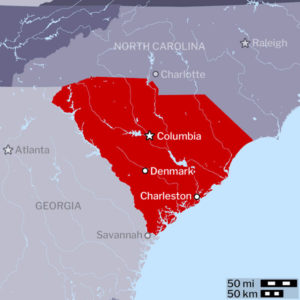 May 20: KKK rally in Denmark, SC. As promised a week ago, the Association of Carolina Klans conducts a march through the small town of Denmark, South Carolina. About 230 Klansmen walk up one side of the town’s main street and back down the other before stopping at the Southern Railway freight platform. Thomas, L. Hamilton, grand dragon of the Carolina Klans, speaks for twenty minutes on the history of the South during Reconstruction, the organization of the Klan, and the Communist threat. A cross burns nearby, but it doesn’t provide enough light for Hamilton to read his speech, so he has to finish it with the aid of a flashlight. The Associated Press reports that this is a smaller gathering than a similar one held here last year. After the meeting, the Klansmen drive to Barnwell State Park for a barbecue supper.
May 20: KKK rally in Denmark, SC. As promised a week ago, the Association of Carolina Klans conducts a march through the small town of Denmark, South Carolina. About 230 Klansmen walk up one side of the town’s main street and back down the other before stopping at the Southern Railway freight platform. Thomas, L. Hamilton, grand dragon of the Carolina Klans, speaks for twenty minutes on the history of the South during Reconstruction, the organization of the Klan, and the Communist threat. A cross burns nearby, but it doesn’t provide enough light for Hamilton to read his speech, so he has to finish it with the aid of a flashlight. The Associated Press reports that this is a smaller gathering than a similar one held here last year. After the meeting, the Klansmen drive to Barnwell State Park for a barbecue supper.![]() May 20: Operation Ezra and Nehemiah begins. A massive airlift gets underway to bring an estimated 125,000 Iraqi Jews to Israel. The first plane loads arrive amid strict Israeli censorship. It is feared that if there is too much publicity, the Iraqi government may call a halt to the exodus since Iraq and Israel are still technically at war. But when Bahgdad discloses the operation, Israel lifts its censorship. In March, Iraq enacted a Law of Denaturalization, giving its Jewish citizens one year to legally emigrate on the condition that they surrender their Iraqi citizenship and never return. So far, 46,000 Jews have registered to leave. Many others are preparing to leave, but are finding it difficult to sell their property due to falling prices in a newly-flooded market.
May 20: Operation Ezra and Nehemiah begins. A massive airlift gets underway to bring an estimated 125,000 Iraqi Jews to Israel. The first plane loads arrive amid strict Israeli censorship. It is feared that if there is too much publicity, the Iraqi government may call a halt to the exodus since Iraq and Israel are still technically at war. But when Bahgdad discloses the operation, Israel lifts its censorship. In March, Iraq enacted a Law of Denaturalization, giving its Jewish citizens one year to legally emigrate on the condition that they surrender their Iraqi citizenship and never return. So far, 46,000 Jews have registered to leave. Many others are preparing to leave, but are finding it difficult to sell their property due to falling prices in a newly-flooded market.
![]()
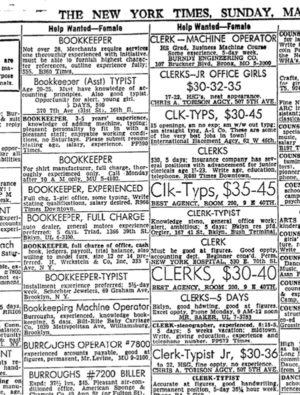 May 20: US Chamber denounces equal pay law. The U.S. Chamber of Commerce tells Congress that employers and employees should be free to work out problems of “equal pay for equal work” on a voluntary basis rather than through legislation. In a letter to Rep. Augustine Kelley (D-PA), chairman of a House Labor subcommittee, the Chamber says that a law mandating equal pay for men and women “would be unwarranted and dangerous to sound wage practices both in organized (union) and unorganized companies. We do not oppose this legislation because we believe that women workers should receive less pay for equal service to that performed by men. Rather, as our policy statement clearly declares, we urge employers to adopt voluntarily such pay practices as will accurately reflect the value of services performed by women.
May 20: US Chamber denounces equal pay law. The U.S. Chamber of Commerce tells Congress that employers and employees should be free to work out problems of “equal pay for equal work” on a voluntary basis rather than through legislation. In a letter to Rep. Augustine Kelley (D-PA), chairman of a House Labor subcommittee, the Chamber says that a law mandating equal pay for men and women “would be unwarranted and dangerous to sound wage practices both in organized (union) and unorganized companies. We do not oppose this legislation because we believe that women workers should receive less pay for equal service to that performed by men. Rather, as our policy statement clearly declares, we urge employers to adopt voluntarily such pay practices as will accurately reflect the value of services performed by women.
▲Sunday, May 21
![]()
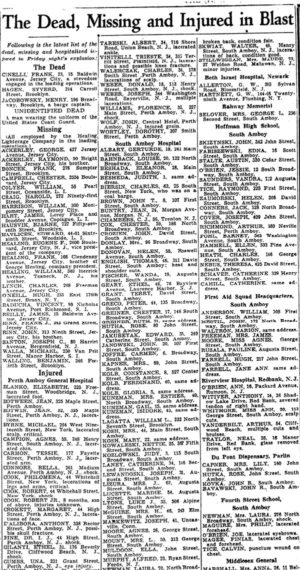 May 21: Fire hits stricken New Jersey town. As residents in South Amboy, New Jersey, bury the dead, console the injured and look for the missing from the massive explosion two days earlier, a fire starts at a phosphorus plant, which is located about 1200 feet from the site of the munitions explosion. Storage drums, damaged by the munitions explosion on Friday, results in the stored phosphorus being exposed to the air. About forty drums spontaneously combust, and the resulting heat from the fire cause about 60 unexploded anti-personnel mines which had fallen in the area to explode intermittently. The explosions not only pose a hazard to fire fighters, but they also throw burning phosphorus and shrapnel throughout the area. Meanwhile, toxic smoke from the phosphorus fire fills the air around Raritan Bay. It will take twenty hours for firefighters to bring the fire under control.
May 21: Fire hits stricken New Jersey town. As residents in South Amboy, New Jersey, bury the dead, console the injured and look for the missing from the massive explosion two days earlier, a fire starts at a phosphorus plant, which is located about 1200 feet from the site of the munitions explosion. Storage drums, damaged by the munitions explosion on Friday, results in the stored phosphorus being exposed to the air. About forty drums spontaneously combust, and the resulting heat from the fire cause about 60 unexploded anti-personnel mines which had fallen in the area to explode intermittently. The explosions not only pose a hazard to fire fighters, but they also throw burning phosphorus and shrapnel throughout the area. Meanwhile, toxic smoke from the phosphorus fire fills the air around Raritan Bay. It will take twenty hours for firefighters to bring the fire under control.
▲Monday, May 22
▲Tuesday, May 23
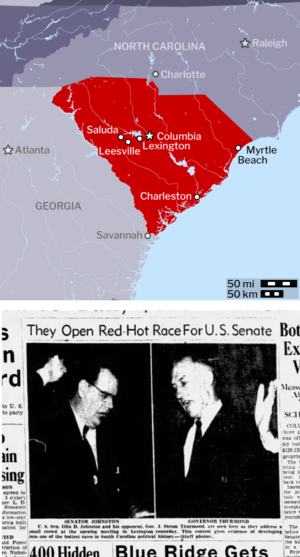 May 23: Strom Thurmond challenges Olin Johnston’s for Senate seat. Like in the rest of the South, the only election that matters in South Carolina is the Democratic primary. The Republican Party is anathema throughout the Old Confederacy, despite its more conservative economic policies being more in line with Southern voters philosophies than those of the New Deal Democrats. And thanks to President Harry Truman’s civil rights policies, he is especially hated in the south, making the Democratic Party there a very different animal than that found elsewhere in the country. In South Carolina, there’s an important tradition associated with the Democratic Primary. It’s the county-to-county “speakings,” in each of the state’s forty-six counties, where voters can hear speeches and debates between the state’s office-seekers. The most closely-watched race this year is the U.S. Senate Race, where Gov. Strom Thurmond is challenging incumbent Sen. Olin D. Johnston. The party’s county-by-county speakings kick off othis year in Lexington this morning and move to Saluda in the afternoon. Segregation is one of many big issues in this campaign. In the 1948 Presidential election, Thurmond led a Southern Democratic revolt and ran as a “Dixiecrat” against Truman, carrying four Southern states in the process, including South Carolina. Johnston opposed Truman’s nomination, but supported him in November. Thurmond is using that against Johnston. “Why didn’t you support the States Rights program two years ago when 90% of the South Carolina Democrats supported it?” Thurmond taunts Johnston as a “Trumanite” and criticizes Johnston for visiting Truman in the White House. “What has Truman done for South Carolina as a result of your talks? Mr. Truman was quoted in the papers today as saying he was going to destroy all segregation of races. Did he do that after your talk with him?” Johnston says Truman’s civil rights program was promoted by Republicans, and calls attention to last Friday’s victory by Southern senators against the Federal Employment Protection Commission bill. Johnston vows he will continue to fight for “the welfare of my people, whether Harry Truman likes it or not.”
May 23: Strom Thurmond challenges Olin Johnston’s for Senate seat. Like in the rest of the South, the only election that matters in South Carolina is the Democratic primary. The Republican Party is anathema throughout the Old Confederacy, despite its more conservative economic policies being more in line with Southern voters philosophies than those of the New Deal Democrats. And thanks to President Harry Truman’s civil rights policies, he is especially hated in the south, making the Democratic Party there a very different animal than that found elsewhere in the country. In South Carolina, there’s an important tradition associated with the Democratic Primary. It’s the county-to-county “speakings,” in each of the state’s forty-six counties, where voters can hear speeches and debates between the state’s office-seekers. The most closely-watched race this year is the U.S. Senate Race, where Gov. Strom Thurmond is challenging incumbent Sen. Olin D. Johnston. The party’s county-by-county speakings kick off othis year in Lexington this morning and move to Saluda in the afternoon. Segregation is one of many big issues in this campaign. In the 1948 Presidential election, Thurmond led a Southern Democratic revolt and ran as a “Dixiecrat” against Truman, carrying four Southern states in the process, including South Carolina. Johnston opposed Truman’s nomination, but supported him in November. Thurmond is using that against Johnston. “Why didn’t you support the States Rights program two years ago when 90% of the South Carolina Democrats supported it?” Thurmond taunts Johnston as a “Trumanite” and criticizes Johnston for visiting Truman in the White House. “What has Truman done for South Carolina as a result of your talks? Mr. Truman was quoted in the papers today as saying he was going to destroy all segregation of races. Did he do that after your talk with him?” Johnston says Truman’s civil rights program was promoted by Republicans, and calls attention to last Friday’s victory by Southern senators against the Federal Employment Protection Commission bill. Johnston vows he will continue to fight for “the welfare of my people, whether Harry Truman likes it or not.”![]()
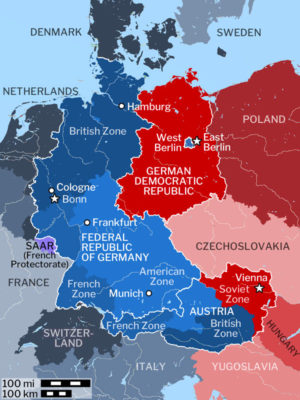 May 23: Western allies say East Germany’s “police” is army in disguise.” The United States, Great Britain and France charge in separate protest notes that the Soviet Union has violated several international agreements dealing with the post-war demilitarization of Germany by creating a police force and militia of 50,000 with “the character of an Army” in East Germany. The American statement contrasts Moscow’s “verbal protestations” in favor of peace and its “violation of its solemn international commitments.” The statement lists five agreements that the creation of the East German “army” violates. The statements notes that the new East German force was “not an ordinary police force, and it does not have ordinary police duties.” Its weaponry includes machine guns, howitzers, anti-aircraft cannons, mortars, and tanks. Its members receive basic infantry, artillery and armored training. “It must be regarded, there, as a military force.” Britain’s note accuses the Soviet Union of “fostering in the Soviet zone in Germany a revival fo the militaristic and aggressive system which the four occupying powers fought together to destroy.”
May 23: Western allies say East Germany’s “police” is army in disguise.” The United States, Great Britain and France charge in separate protest notes that the Soviet Union has violated several international agreements dealing with the post-war demilitarization of Germany by creating a police force and militia of 50,000 with “the character of an Army” in East Germany. The American statement contrasts Moscow’s “verbal protestations” in favor of peace and its “violation of its solemn international commitments.” The statement lists five agreements that the creation of the East German “army” violates. The statements notes that the new East German force was “not an ordinary police force, and it does not have ordinary police duties.” Its weaponry includes machine guns, howitzers, anti-aircraft cannons, mortars, and tanks. Its members receive basic infantry, artillery and armored training. “It must be regarded, there, as a military force.” Britain’s note accuses the Soviet Union of “fostering in the Soviet zone in Germany a revival fo the militaristic and aggressive system which the four occupying powers fought together to destroy.”
![]()
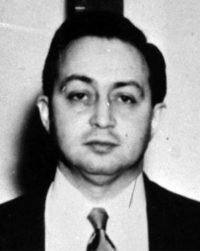 May 23: Harry Gold arrested for espionage. Harry Gold, a laboratory chemist at Philadelphia General Hospital, is arrested on espionage charges. He was identified by convicted spy Klaus Fuchs as a courier for passing atomic secrets to the Soviets. Gold will confess and identify others connected to the espionage network including David Greenglass, who will be arrested in June.
May 23: Harry Gold arrested for espionage. Harry Gold, a laboratory chemist at Philadelphia General Hospital, is arrested on espionage charges. He was identified by convicted spy Klaus Fuchs as a courier for passing atomic secrets to the Soviets. Gold will confess and identify others connected to the espionage network including David Greenglass, who will be arrested in June.
▲Wednesday, May 24
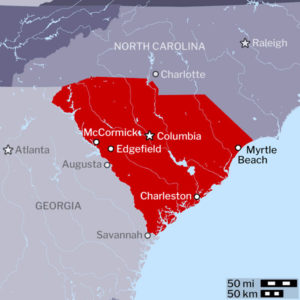 May 24: South Carolina Senate Race: Strom Thurmond denounces integrated armed services. The bitter South Carolina Democratic primary campaign between Gov. Strom Thurmond and Sen. Olin D. Johnston for Johnston’s Senate seat reaches its second official day when the party’s county-to-county “speakings” arrive in McCormick and Edgefield, Thurmond’s hometown. Both towns are in the heart of Klan country that has seen activity just the past four weeks. Thurmond criticizes Johnston for “joining the Trumancrats in 1948 while I was fighting for states’ rights against civil rights,” and criticizes Truman’s executive order that desegregated the U.S. armed forces. If there is another war, Thurmond says, “our white boys and girls in service … would be forced to sleep in the same barracks, eat in the same mess halls and use the same recreational facilities as Negroes. Now what I want you to remember is this: my opponent was in the Senate when all this was going on. He did not open his mouth in protest. … If I had been in the Senate you would have heard from me.” Johnston downplays his support for Truman in 1948, saying that a Democrat in the White House is better for South Carolina than a Republican. “I am thankful the Democratic Party is bigger than the little man now in the White House.” Referring to Franklin D. Roosevelt’s 1945 death while in office with Truman as vice president, Johnston adds, “He (Truman) got in there only by accident.”
May 24: South Carolina Senate Race: Strom Thurmond denounces integrated armed services. The bitter South Carolina Democratic primary campaign between Gov. Strom Thurmond and Sen. Olin D. Johnston for Johnston’s Senate seat reaches its second official day when the party’s county-to-county “speakings” arrive in McCormick and Edgefield, Thurmond’s hometown. Both towns are in the heart of Klan country that has seen activity just the past four weeks. Thurmond criticizes Johnston for “joining the Trumancrats in 1948 while I was fighting for states’ rights against civil rights,” and criticizes Truman’s executive order that desegregated the U.S. armed forces. If there is another war, Thurmond says, “our white boys and girls in service … would be forced to sleep in the same barracks, eat in the same mess halls and use the same recreational facilities as Negroes. Now what I want you to remember is this: my opponent was in the Senate when all this was going on. He did not open his mouth in protest. … If I had been in the Senate you would have heard from me.” Johnston downplays his support for Truman in 1948, saying that a Democrat in the White House is better for South Carolina than a Republican. “I am thankful the Democratic Party is bigger than the little man now in the White House.” Referring to Franklin D. Roosevelt’s 1945 death while in office with Truman as vice president, Johnston adds, “He (Truman) got in there only by accident.”▲Thursday, May 25
Empire Day (Canada)
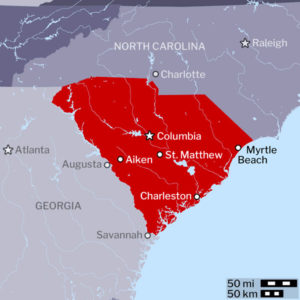 May 25: South Carolina Senate race: Thurmond says Johnston “silent as a tomb” on military desegregation. The South Carolina Democratic Party’s county-to-county “speakings” featuring Gov. Strom Thurmond and Sen. Olin D. Johnston goes to Aiken in the morning and St. Matthews in the afternoon for the third day of the party’s official campaign season. Thurmond, the 1948 “Dixiecrat” presidential candidate against Harry Truman, is trying to unseat Johnston, who bitterly opposed Truman’s nomination then supported him in the general election. Johnston is now running against Truman’s civil rights record in South Carolina. Thurmond charges Johnston with “wobbling in and wobbling out so much it is hard to keep up with him. First he is against Truman, then he is for him. Now he is against him when the Democrats of South Carolina begin blowing on his neck.” Johnston defends working within the Democratic party, citing the successful filibuster of the Federal Employment Practices bill. “Don’t you be hoodwinked. The South must remain inside the Democratic Party … Our strongest bulwark is to remain in the Democratic Party. Whether you like it or not, Truman is President for two more years … I don’t like it, but I can’t help it. No Truman or Humphrey (referring to Sen. Hubert Humphry (D-MN)) is going to run me out of the party of my forefathers.” Thurmond accuses Johnston of remaining “silent as a tomb” when Truman ordered the desegregation of the U.S. military. “If I had been in the Senate … I would not have been silent. I would have taken a stand with Bradley, Eisenhower and Marshall and would have opposed integrating the races.” Thurmond invokes his 1948 campaign and says, “I fought for states’ rights and we will continue to fight for states rights.” The debates that have taken place over the past three days will set the tone for the next five weeks of campaigning in each of the state’s forty-six counties.
May 25: South Carolina Senate race: Thurmond says Johnston “silent as a tomb” on military desegregation. The South Carolina Democratic Party’s county-to-county “speakings” featuring Gov. Strom Thurmond and Sen. Olin D. Johnston goes to Aiken in the morning and St. Matthews in the afternoon for the third day of the party’s official campaign season. Thurmond, the 1948 “Dixiecrat” presidential candidate against Harry Truman, is trying to unseat Johnston, who bitterly opposed Truman’s nomination then supported him in the general election. Johnston is now running against Truman’s civil rights record in South Carolina. Thurmond charges Johnston with “wobbling in and wobbling out so much it is hard to keep up with him. First he is against Truman, then he is for him. Now he is against him when the Democrats of South Carolina begin blowing on his neck.” Johnston defends working within the Democratic party, citing the successful filibuster of the Federal Employment Practices bill. “Don’t you be hoodwinked. The South must remain inside the Democratic Party … Our strongest bulwark is to remain in the Democratic Party. Whether you like it or not, Truman is President for two more years … I don’t like it, but I can’t help it. No Truman or Humphrey (referring to Sen. Hubert Humphry (D-MN)) is going to run me out of the party of my forefathers.” Thurmond accuses Johnston of remaining “silent as a tomb” when Truman ordered the desegregation of the U.S. military. “If I had been in the Senate … I would not have been silent. I would have taken a stand with Bradley, Eisenhower and Marshall and would have opposed integrating the races.” Thurmond invokes his 1948 campaign and says, “I fought for states’ rights and we will continue to fight for states rights.” The debates that have taken place over the past three days will set the tone for the next five weeks of campaigning in each of the state’s forty-six counties.![]()
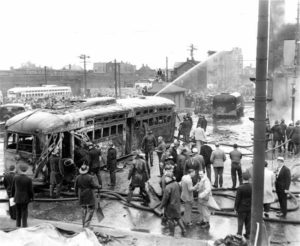 May 25: Chicago street car explosion kills 34. A Chicago Green Hornet streetcar, packed with evening rush-hour commuters, collides with a gasoline truck at 63rd and State Streets. The streetcar goes into a switch to avoid a flooded underpass. But the motorman, apparently not paying attention, drives through the switch at full speed and rams the dual-trailer truck carrying about eight thousand gallons of fuel. The leaking fuel explodes and catches fire, engulfing the streetcar. Thirty-four are killed, including the motorman and truck driver. Fifty are injured, more than half of them critically. A river of flaming gasoline flows down State Street, setting fire to several parked cars and eight buildings.
May 25: Chicago street car explosion kills 34. A Chicago Green Hornet streetcar, packed with evening rush-hour commuters, collides with a gasoline truck at 63rd and State Streets. The streetcar goes into a switch to avoid a flooded underpass. But the motorman, apparently not paying attention, drives through the switch at full speed and rams the dual-trailer truck carrying about eight thousand gallons of fuel. The leaking fuel explodes and catches fire, engulfing the streetcar. Thirty-four are killed, including the motorman and truck driver. Fifty are injured, more than half of them critically. A river of flaming gasoline flows down State Street, setting fire to several parked cars and eight buildings.
![]()
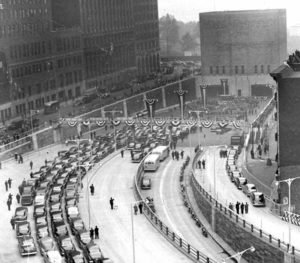 May 25: Brooklyn-Battery Tunnel opens. The Brooklyn-Battery Tunnel, connecting lower Manhattan at Battery Park and Brooklyn, opens to the public amid tremendous pomp and ceremony. Construction began in 1940 and it was supposed to be finished in 1944, but the war interrupted work in 1942, and post-war shortages and construction complications pushed its completion back to 1950. The project cost eight lives and $80 million (about $860 million today). The tunnel is the longest vehicular tunnel in the U.S. to date. Twenty minutes after the tunnel’s opening, a car stalls in the Manhattan-bound tube, causing a traffic backup in Brooklyn.
May 25: Brooklyn-Battery Tunnel opens. The Brooklyn-Battery Tunnel, connecting lower Manhattan at Battery Park and Brooklyn, opens to the public amid tremendous pomp and ceremony. Construction began in 1940 and it was supposed to be finished in 1944, but the war interrupted work in 1942, and post-war shortages and construction complications pushed its completion back to 1950. The project cost eight lives and $80 million (about $860 million today). The tunnel is the longest vehicular tunnel in the U.S. to date. Twenty minutes after the tunnel’s opening, a car stalls in the Manhattan-bound tube, causing a traffic backup in Brooklyn.
▲Friday, May 26
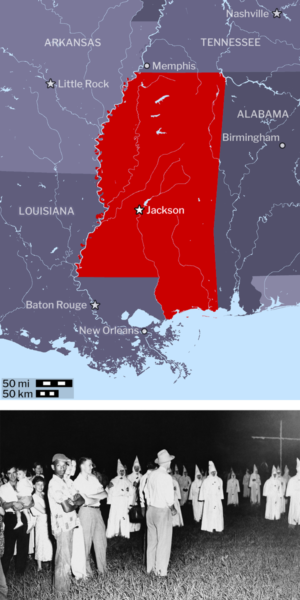 May 26: Mississippi cross-burning fizzles. Lycurgus Spinks, self-proclaimed Imperial Emperor of the Jackson, Mississippi, Ku Klux Klan, promised this week that tonight’s rally would feature a parade of “100 robed klansmen beneath a blazing 20-foot cross.” What actually transpired was about 56 robed klansmen marching around an unlit cross after police warn Spinks that it’s illegal to burn combustable materials in the city after dark. Spinks isn’t happy. “The fiery cross is part of the ceremony of our Klavern,” roars the 66-year-old Baptist preacher. “You burn your cigarettes at night, your cigars … but apparently the law against burning combustibles applies only to the fiery cross.” Spinks says federal aid programs are plots to break down segregation, and he attacks Southern Democrats for accepting that aid. “We are fighting for the rights that State Righters only talk about … They are hollering for state rights and then manhandling the federal government for all the money they can get.” The warm, humid night makes things uncomfortable for Spinks, who sheds his robe midway through his speech. The Jackson Clarion-Ledger reports the rally drew a very small crowd composed mostly of curiosity-seekers, including “a wondering Negro boy (who) mingles with spectators.” This is the first public Klan rally in the Jackson area in fifteen years. Spinks declares, “We’re back in Jackson and in every county in the state, and we are going to be here when a lot of our critics are in hell.”
May 26: Mississippi cross-burning fizzles. Lycurgus Spinks, self-proclaimed Imperial Emperor of the Jackson, Mississippi, Ku Klux Klan, promised this week that tonight’s rally would feature a parade of “100 robed klansmen beneath a blazing 20-foot cross.” What actually transpired was about 56 robed klansmen marching around an unlit cross after police warn Spinks that it’s illegal to burn combustable materials in the city after dark. Spinks isn’t happy. “The fiery cross is part of the ceremony of our Klavern,” roars the 66-year-old Baptist preacher. “You burn your cigarettes at night, your cigars … but apparently the law against burning combustibles applies only to the fiery cross.” Spinks says federal aid programs are plots to break down segregation, and he attacks Southern Democrats for accepting that aid. “We are fighting for the rights that State Righters only talk about … They are hollering for state rights and then manhandling the federal government for all the money they can get.” The warm, humid night makes things uncomfortable for Spinks, who sheds his robe midway through his speech. The Jackson Clarion-Ledger reports the rally drew a very small crowd composed mostly of curiosity-seekers, including “a wondering Negro boy (who) mingles with spectators.” This is the first public Klan rally in the Jackson area in fifteen years. Spinks declares, “We’re back in Jackson and in every county in the state, and we are going to be here when a lot of our critics are in hell.”![]()
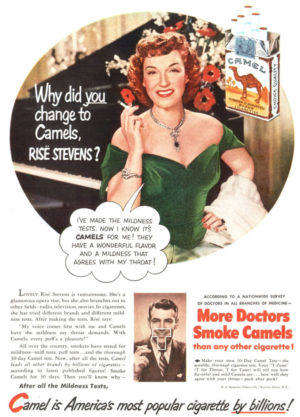 May 26: AMA Journal links smoking and lung cancer. Two reports published today in the American Medical Association Journal warn that there appears to be a significant link between prolonged tobacco smoking and lung cancer. One report by Drs. Evarts Graham and earnest L. Wynder of St. Louis finds that among 605 men with lung cancer 96½% of them were moderately heavy or chain smokers. They report that lung cancer is very rare among non-smokers or occasional smokers. A second study by Drs. Morton L. Levin, Hyman Goldstein, and Paul Gerhardt of Buffalo, New York, looked at 1,650 patients and found that lung cancer occurs more than twice as often among those who have smoked cigarettes for twenty-five years or more than it does among other smokers (pipe or cigar) or non-smokers. They attribute the higher rate of lung cancer among cigarette smokers to the greater practice of inhalation.
May 26: AMA Journal links smoking and lung cancer. Two reports published today in the American Medical Association Journal warn that there appears to be a significant link between prolonged tobacco smoking and lung cancer. One report by Drs. Evarts Graham and earnest L. Wynder of St. Louis finds that among 605 men with lung cancer 96½% of them were moderately heavy or chain smokers. They report that lung cancer is very rare among non-smokers or occasional smokers. A second study by Drs. Morton L. Levin, Hyman Goldstein, and Paul Gerhardt of Buffalo, New York, looked at 1,650 patients and found that lung cancer occurs more than twice as often among those who have smoked cigarettes for twenty-five years or more than it does among other smokers (pipe or cigar) or non-smokers. They attribute the higher rate of lung cancer among cigarette smokers to the greater practice of inhalation.
![]() May 26: Gasoline rationing abruptly ends in the United Kingdom after nearly eleven years. The announcement comes soon after the British government negotiates supply deals with Standard Oil of New Jersey and California Texas (Caltex) Oil. According to the deals, the two oil companies will accept sterling for oil instead of dollars, and they will spend much of that sterling buying British tankers and other goods. This allows Britain to conserve its dwindling dollar reserves and use them for scarce foods and raw materials. Seaside resorts in the north are besieged with phone calls as Britons try to book a quick weekend holiday. Second-hand car dealers begin boosting prices in anticipation of increased demand now that petrol is derationed. But at a record high of 3 shillings per Imperial gallon (about £1.15 per litre or US$5.40 per U.S. gallon today), it will continue to be essentially rationed by price.
May 26: Gasoline rationing abruptly ends in the United Kingdom after nearly eleven years. The announcement comes soon after the British government negotiates supply deals with Standard Oil of New Jersey and California Texas (Caltex) Oil. According to the deals, the two oil companies will accept sterling for oil instead of dollars, and they will spend much of that sterling buying British tankers and other goods. This allows Britain to conserve its dwindling dollar reserves and use them for scarce foods and raw materials. Seaside resorts in the north are besieged with phone calls as Britons try to book a quick weekend holiday. Second-hand car dealers begin boosting prices in anticipation of increased demand now that petrol is derationed. But at a record high of 3 shillings per Imperial gallon (about £1.15 per litre or US$5.40 per U.S. gallon today), it will continue to be essentially rationed by price.
![]() May 26: Attorney General blasts McCarthy for “embracing the methods of the secret police”: Attorney General J. Howard McGrath denounces the tactics of Sen. Joseph McCarthy’s (R-WI) hunt for Communists in government employment. Addressing a Jefferson-Jackson day Democratic dinner on Omaha, and without mentioning McCarthy by name, McGrath lambasts McCarthy’s tactic of making serious charges on the Senate floor where he is protected by the cloak of Congressional immunity, and then refusing to make the same charges when speaking elsewhere. “If our democracy is not to die by its own hand, it must not adopt the secret police tactics of the Nazis to combat the secret police of the Communists,” he says. “Yet, right now, there are individuals who for one reason or another would have us embrace the methods of the secret police and wrong innocent men and women in the name of national security. … A moral issue of major importance is before us. The time has come to stand up and be counted is while the issue is before us, not after it is settled.”
May 26: Attorney General blasts McCarthy for “embracing the methods of the secret police”: Attorney General J. Howard McGrath denounces the tactics of Sen. Joseph McCarthy’s (R-WI) hunt for Communists in government employment. Addressing a Jefferson-Jackson day Democratic dinner on Omaha, and without mentioning McCarthy by name, McGrath lambasts McCarthy’s tactic of making serious charges on the Senate floor where he is protected by the cloak of Congressional immunity, and then refusing to make the same charges when speaking elsewhere. “If our democracy is not to die by its own hand, it must not adopt the secret police tactics of the Nazis to combat the secret police of the Communists,” he says. “Yet, right now, there are individuals who for one reason or another would have us embrace the methods of the secret police and wrong innocent men and women in the name of national security. … A moral issue of major importance is before us. The time has come to stand up and be counted is while the issue is before us, not after it is settled.”
▲Saturday, May 27
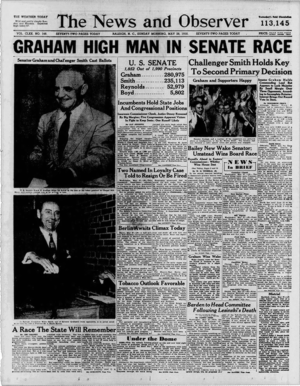 May 27: North Carolina Senate Race: Graham fails to win Democratic Senate primary outright. Sen. Frank Graham grabs the top spot in the North Carolina Democratic primary in the contest for his U.S. Senate seat, but with 49.1% of the vote, he fails to grab more than half of the total votes cast for the race. Willis Smith, his conservative race-baiting challenger, comes in second with 40.5%, and Sen. Bob Reynolds brings up the rear with 9.5%. A runoff between Smith and Graham isn’t automatic — Smith will have to request it. This race-baiting contest has brought out the highest voter participation of any North Carolina primary. Whoever wins the Democratic primary is virtually guaranteed to win the general election in November. Smith has until June 12 to decide whether to call for a rematch. If he does, it will be held on June 24.
May 27: North Carolina Senate Race: Graham fails to win Democratic Senate primary outright. Sen. Frank Graham grabs the top spot in the North Carolina Democratic primary in the contest for his U.S. Senate seat, but with 49.1% of the vote, he fails to grab more than half of the total votes cast for the race. Willis Smith, his conservative race-baiting challenger, comes in second with 40.5%, and Sen. Bob Reynolds brings up the rear with 9.5%. A runoff between Smith and Graham isn’t automatic — Smith will have to request it. This race-baiting contest has brought out the highest voter participation of any North Carolina primary. Whoever wins the Democratic primary is virtually guaranteed to win the general election in November. Smith has until June 12 to decide whether to call for a rematch. If he does, it will be held on June 24.![[Emphasis Mine]](http://jimburroway.com/wp-content/uploads/2018/01/JuliusSipIn.jpg)
